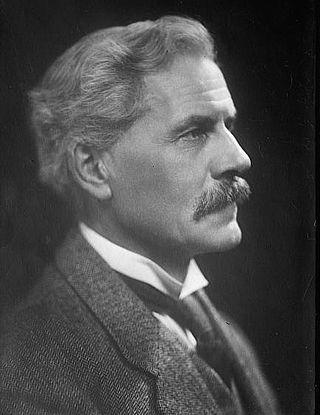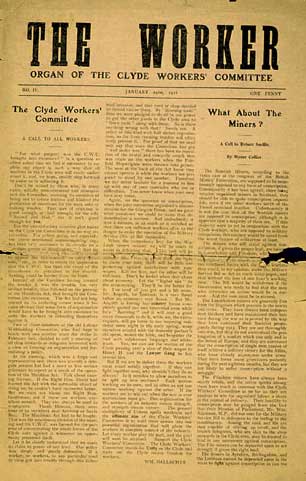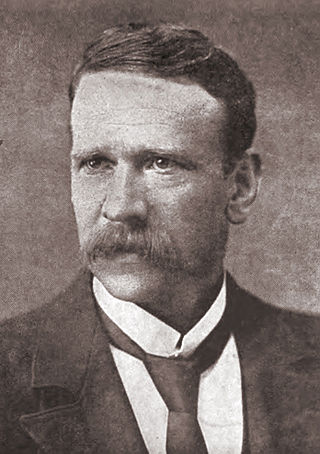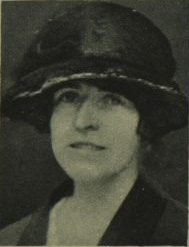
William Gallacher was a Scottish trade unionist, activist and communist. He was one of the leading figures of the Shop Stewards' Movement in wartime Glasgow and a founding member of the Communist Party of Great Britain. He served two terms in the House of Commons as the last Communist Member of Parliament (MP).
Red Clydeside was the era of political radicalism in Glasgow, Scotland, and areas around the city, on the banks of the River Clyde, such as Clydebank, Greenock, Dumbarton and Paisley, from the 1910s until the early 1930s. Red Clydeside is a significant part of the history of the labour movement in Britain as a whole, and Scotland in particular.

The first Highland Land League emerged as a distinct political force in Scotland during the 1880s, with its power base in the country's Highlands and Islands. It was known also as the Highland Land Law Reform Association and the Crofters' Party. It was consciously modelled on the Irish Land League.

The first MacDonald ministry of the United Kingdom lasted from January to November 1924. The Labour Party, under Ramsay MacDonald, had failed to win the general election of December 1923, with 191 seats, although the combined Opposition tally exceeded that of the Conservative government, creating a hung parliament. Stanley Baldwin remained in office until January 1924.

A rent strike is a method of protest commonly employed against large landlords. In a rent strike, a group of tenants come together and agree to refuse to pay their rent en masse until a specific list of demands is met by the landlord. This can be a useful tactic of final resort for use against intransigent landlords, but carries the obvious risk of eviction and bad credit history in some cases.

The War Precautions Act 1914 was an Act of the Parliament of Australia which gave the Government of Australia special powers for the duration of World War I and for six months afterwards.

Mary Barbour was a Scottish political activist, local councillor, bailie and magistrate. Barbour was closely associated with the Red Clydeside movement in the early 20th century and especially for her role as the main organiser of the women of Govan who took part in the rent strikes of 1915.

Sir Patrick Joseph Dollan and his wife, Agnes, Lady Dollan were Glasgow activists in the Scottish Independent Labour Party. During the First World War they campaigned against the Munitions of War Act of 1915 which suspended trade unionists' rights for the duration of hostilities.

The Clyde Workers Committee was formed to campaign against the Munitions Act. It was originally called the Labour Withholding Committee. The leader of the CWC was Willie Gallacher, who was jailed under the Defence of the Realm Act 1914 together with John Muir for an article in the CWC journal The Worker criticising the First World War.

The Munitions of War Act 1915 was a British Act of Parliament passed on 2 July 1915 during the First World War. It was designed to maximize munitions output and brought private companies supplying the armed forces under the tight control of the newly created Ministry of Munitions, under David Lloyd George. The policy, according to J. A. R. Marriott, was that:

Robert Smillie was a Scottish trade unionist and Labour Party politician. He was a leader of the coal miners, and played a central role in moving support from the miners away from the Liberal Party to the Labour Party. He had a firm commitment to socialism as an ideal, and militancy as a tactic.
The history of rent control in England and Wales is a part of English land law concerning the development of rent regulation in England and Wales. Controlling the prices that landlords could make their tenants pay formed the main element of rent regulation, and was in place from 1915 until its abolition by the Housing Act 1988.
Rent control in Scotland is based upon the statutory codes relating to private sector residential tenancies. Although not strictly within the private sector, tenancies granted by housing associations, etc., are dealt with as far as is appropriate in this context. Controlling prices, along with security of tenure and oversight by an independent regulator or the courts, is a part of rent regulation.
The politics of Glasgow, Scotland's largest city by population, are expressed in the deliberations and decisions of Glasgow City Council, in elections to the council, the Scottish Parliament and the UK Parliament.
Rent regulation in England and Wales is the part of English land law that creates rights and obligations for tenants and landlords. The main areas of regulation concern,

Agnes Johnston Dollan MBE, also known as Agnes, Lady Dollan, was a Scottish suffragette and political activist. She was a leading campaigner during the Glasgow Rent Strikes, and a founding organiser of the Women's Peace Crusade. In 1919, she was the first woman selected by the Labour party to stand for election to Glasgow Town Council, and later became Lady Provost of Glasgow.
Mary Laird was a founding member and first President of the Glasgow Women's Housing Association, a President of the Partick Branch of the Women's Labour League, associated with the Red Clydeside movement, and supported the Glasgow Rent Strikes of 1915 alongside Mary Barbour, Agnes Dollan, Mary Jeff and Helen Crawfurd. Laird went on to participate in wider social activism for women and children's rights.
South Govan Women's Housing Association was established in 1915 under the leadership by Mary Barbour in Govan on the south side of Glasgow in Scotland.
Glasgow Women's Housing Association (GWHA) was established in Glasgow, Scotland, in mid-1914 by the Independent Labour Party Housing Committee launched by Andrew McBride in 1913 and the Women's Labour League in reaction to the increasing rent prices and overcrowding exacerbated by the advent of the First World War.

Jenny Kerr Hyslop born Janet Kerr Reid was a Scottish community leader, co-operative worker and disability activist.












